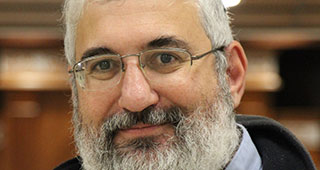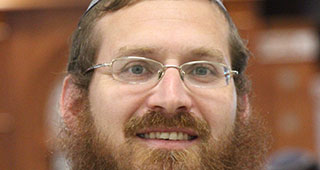Beit Midrash
- Shabbat and Holidays
- Jewish Holidays
- Sukkot
The Torah study is dedicatedin the memory of
Freicha daughter of Ester
2. Jacob and Succot According to the Zohar
"And Jacob Traveled to Succot"
More so than any of the other Patriarchs, Jacob was the wanderer. Scripture relates, "And Jacob fled from before Esau his brother to the field of Aram." Neither did he find comfort there, for he was forced to deal with Lavan’s rogues. When Jacob later returned to the Land of Israel he wished only to settle down peacefully, but he was immediately forced to deal with the loss of his son Joseph. Only in Egypt, during his twilight years, was Jacob able to find relative peace. Yet, even there it is not written, "And Jacob settled in Egypt," rather, "And Jacob lived…" lived – yes, settled – no. There can be no permanent settlement except in the Land of Israel.
Transience and impermanence are diametrically opposed to stability and permanency. Man needs spiritual stability. Otherwise, one’s personality is liable to become shaken. Jacob’s greatness lay in the fact that he managed to maintain his spiritual stability even in the midst of the life crises with which he had to deal. He lived with Lavan yet upheld the 613 commandments. Jacob was forced to deal slyly in with his relatives, Esau and Lavan. In order to survive, he was forced to employ crafty devices and ways so to undermine the cheaters and hunters which he came up against. He also paid a great price for this. Still, his personality was not wrinkled. He remained upright and pure in his ways. "Jacob was pure in his ways," say the sages, "Give truth to Jacob."
Even Jacob’s two names say something of his mental strength in the face of the life conditions which he endured. He was named Jacob after the "akev," or heel - the curved area at the base of the leg. The word "akev" also carries the meaning of a cause. Jacob’s other name, Israel, contains the Hebrew word "yashar" or straight. For, despite his many struggles with forces more numerous or powerful than he, he remained "straight" and upright.
Israel, the aspiration to uprightness, purity, and truth – this is the ideal name. Jacob, the necessity to face the evil and cruel reality in our world – is the actual name. The tension between the real and the ideal accompanies the long and complicated history of the People of Israel, known primarily by their ideal name. This teaches us that despite all of the complications and the trials, the battle for uprightness and truth has not been lost. To the contrary, it has become stronger and mightier. The wandering Jew, even when he walked through the valley of the shadow of death, did not fear the evil forces which attempted to forcibly convert and confuse him. Yet, the more they tortured him, the more he multiplied and grew. The People of Israel, in its long and winding path, faced changing conditions and various cultures yet its eternal principals remained firm and unshaken. Like a central bolt which runs from one side to the next, running through all of the parts, right, left, east and west. This remarkable flexibility, which despite its flexibility remains straight and upright, this is the hidden power of Jacob, who, in this sense, has never died. Just as he lives on, his seed lives on.
Jacob and Succot According to the Zohar
According to the Zohar, there is direct relation between the Patriarch Jacob and the Succot festival. The Torah, in Genesis 33 tells us: "Esau returned along the way to Seir on that day. Jacob went to Succot." The Zohar expounds upon the juxtaposition of these subjects, the sending away of Esau to Seir, and the mention of Succot, likening them to the relation between the Day of Atonement on which the scapegoat is sent to Azazel, and the entrance of Israel, the Jewish people, into their Succot. After Jacob, the idealist, freed himself from the influence of Esau, the materialist, he was able to relax in the shade of truth and faith in his Succah. This, the Succah, is the antithesis of aggressiveness, dominance, and evil. There is almost nothing physical about it; it is comprised of little more than Jewish law and faith.
The Succot Festival actually contains a double message: On the one hand, the Succah symbolizes transience and impermanence - you might say, the exile. The Succah is temporary. "Dwell therein as you live." Man dwells in a permanent manner in his Succah for seven days. You might call it a "holy" dwelling – a kind of little Israel among the nations. Yet there is no contradiction between the two. Even in the exile, in difficult circumstances, when we wandered in wide-open places, among wild animals, even there we developed our culture and strengthened our spirit.
This double message carries far-reaching real and actual implications. In our time, the home is wide open. The media in its many forms – written, electronic, spoken, have exposed the home to the world, and the winds of the world at large penetrate all corners of the home. The home is no longer stable as it once was. It is shaky. It is no longer a guarded fortress. All the same, the home is a Jewish one, and will remain that way forever, despite the attempts to destroy it. In it, more than any other place, the spirit of the individual, the family, and the nation must be guarded and developed. It is possible. Our nation possesses the inner strength, strength which we inherited from Jacob, to take on the challenging and trying difficulties. It is possible to overcome the temptations and prevent the dangers. We are all the offspring of Israel who struggled with even greater forces than these. We have the power to filter things and to receive only the good and the beautiful, the straight and the true, to discard falsity and ugliness, crudeness, unruliness, and evil. Even if our Succah appears to be unstable, a mighty spirit fills its openings and reinforces its cracks.

Laws of the Etrog
How to choose an Etrog
Rabbi Ido Yaakovi

Judgement or Joy?
Rabbi Yair Wassertheil | Tishrei 19 5783

Sukkah Walls
Rabbi Yirmiyohu Kaganoff | Tishrei 8 5777





















